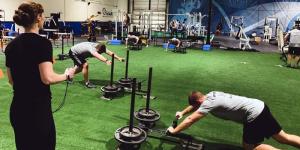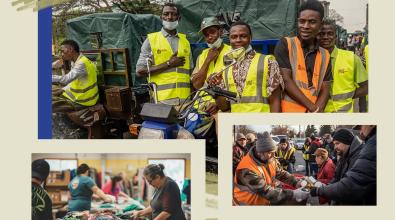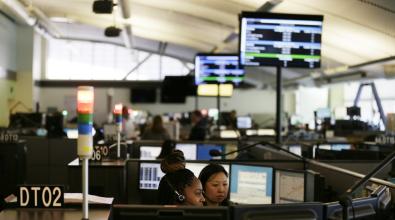How one city is prioritizing the wellbeing of its first responders

As COVID-19 puts new strains on the nation’s emergency medics, firefighters, and police officers on the frontlines of the crisis, an upstart program in West Virginia is showing how first responders can do something that doesn’t always come naturally: put their own health and wellness first.
The program in the city of Huntington is aimed at keeping bone-weary first responders from burning out under stress. Although it was originally designed with the pressures of the opioid crisis in mind, it’s proving adaptable and useful as first responders walk a new tightrope with COVID-19.
The innovative project, known as Compass, is crucial to Mayor Steve Williams’ ambitious, overarching goal: Recasting Huntington’s identity from a locus of opioid overdoses to a source of solutions, in part by attending to the health of first responders. Funded through a Bloomberg Philanthropies Mayors Challenge grant, the knowledge and expertise developed in Huntington may be useful to other cities facing similar challenges. Local leaders from Ohio, Virginia, and other parts of West Virginia have inquired about what Huntington is up to.
Two of the women powering this effort are Amy Jefferson and Amy Hanshaw — or “the Amys,” as everyone in the police and fire departments know them. Their job is to build relationships with the city’s first responders that will translate to gains in mental health and physical fitness — demonstrating the city’s commitment to the people on Huntington’s front lines. As Fire Chief Jan Rader puts it, the Amys are “the heart and soul of Compass.”
Jefferson’s expertise is in mental wellness; she blends a background in social work with hard-won empathy, the result of tragic losses within her own family. Hanshaw’s area is physical wellness; beyond her professional bona fides, as a certified trainer with a master’s degree in Exercise Physiology, she is a long-time Huntingtonian, with century-deep roots in the community. Together, the Amys are making inroads with firefighters and police officers who aren’t always comfortable asking others for help.
As drug overdoses and related deaths swelled from 2014–18, it took an emotional toll on Huntington’s first responders. There was talk of “compassion fatigue” — and some staff turnover — as first responders found themselves repeatedly reviving the same patients, only to see them later die. These victims weren’t just nameless strangers but neighbors, teammates, childhood friends.
“Younger guys were seeing their classmates overdosing in their 20s and 30s,” Jefferson said. “It’s not something normal to see. You can’t imagine what that does.”
Jefferson is now a regular presence at Fire Department and and Police Department roll calls and briefings. “I show up after a critical incident,” she explained. “I validate feelings, give them an opportunity to vent. They’ve never had that before, and they’re surprised how much it helps. Talking about feelings is a new thing to them. I think it’s a relief.”
“I look at these guys like they’re family,” she said. “I don’t go in with an agenda, I don’t put them on the spot.” Friendly conversations become the foundation for deeper talks. “These guys have this perceived need to put out bravado,” Jefferson said. “If I can get them to open up, talk about mental health — we can help them.”
[Read: Mayors challenge: Meet the people driving 9 Mayors Challenge projects]
Getting first responders to open up, outside their ranks, is no easy task. They often prefer physical activity to conversation. That’s where Hanshaw plays a big role: She’s as tough as they are. And she’s ready with a workout at the drop of a hat.
Hanshaw was brand-new to her job when she fielded a thrilling request: The head of the city’s SWAT team wanted a cross-training workout. And he wanted Amy to design it.
“I just about fell over. These guys, they’re a different breed. I had it in my head that it would be really hard to break in and get to know them. For them to say, hey! We want a workout from you — well, that’s perfect,” Hanshaw said.
For SWAT team chief Jason Young, Hanshaw’s workout succeeded on multiple levels: It pushed the already-fit team in new ways — and the shared challenge built morale.
“Everyone’s excited about the potential for what this could bring to the police department,” Young said. His team loved Hanshaw’s workout and is asking for more. “The mental health thing, that doesn’t come to most policemen as easy, they don’t want to talk about things like that. But hopefully, we’ll crack that egg.”
It took a while to get buy-in for the wellness push in the police and fire ranks. Cathy Burns, the former city manager, said initial skepticism melted over time. “We didn’t go away, and we kept ramping up our interactions, showing up every day to show that we’re still here, we’re committed,” Burns said. “That’s when we started having informal leaders, in the lower ranks, buying in. When they started committing back, we knew we were making headway.”
Hanshaw proved her value by making the SWAT team sweat. Jefferson carries her weight in impromptu, informal conversations with rank-and-file officers, about mental health worries, potential depression and PTSD. Neither woman believes she could be fully successful without her partner’s support — their partnership covers all the bases.
Now, COVID-19 is changing how first responders and the Amys work. While Huntington hasn’t been hit as hard as other parts of the country, physical distancing means their day-to-day interactions happen through phone calls and Zoom meetings, not in-person. Each misses the daily contact — and especially, the small moments when a person’s body language (or silence) reveals more than speech.
[Get the City Hall Coronavirus Daily Update. Subscribe here.]
Amy Jefferson gave one recent example when, after a traumatic incident that resulted in the death of an infant, she telephoned the police officers who caught the case. “They all say, ‘I’m fine, I’m fine’ — but it’s just different when you can see someone face-to-face, they’re more likely to open up in person than over the phone.”
“My job is just so dependent on face-to-face interactions and personal contact,” Hanshaw said. “I didn’t realize it would affect me so much — but it has.” Both Amys are hopeful they’ll get back to work relatively soon, even if it means keeping six feet apart from their colleagues and wearing facemasks and other protective gear. They know the idea that first responders need to take care of their own mental and physical health so that they’re better able to take care of others may be more important now more than ever.
“This is my community,” Hanshaw said. In good times and hard times, times of health and times of deep uncertainty, Huntington has weathered difficult storms, and will this time, too. “I grew up here, I know people, they know my family — they know me. For me to be able to give back to these first responders, who are laying their lives on the line every day to help the community I grew up in, that’s a dream come true.”



